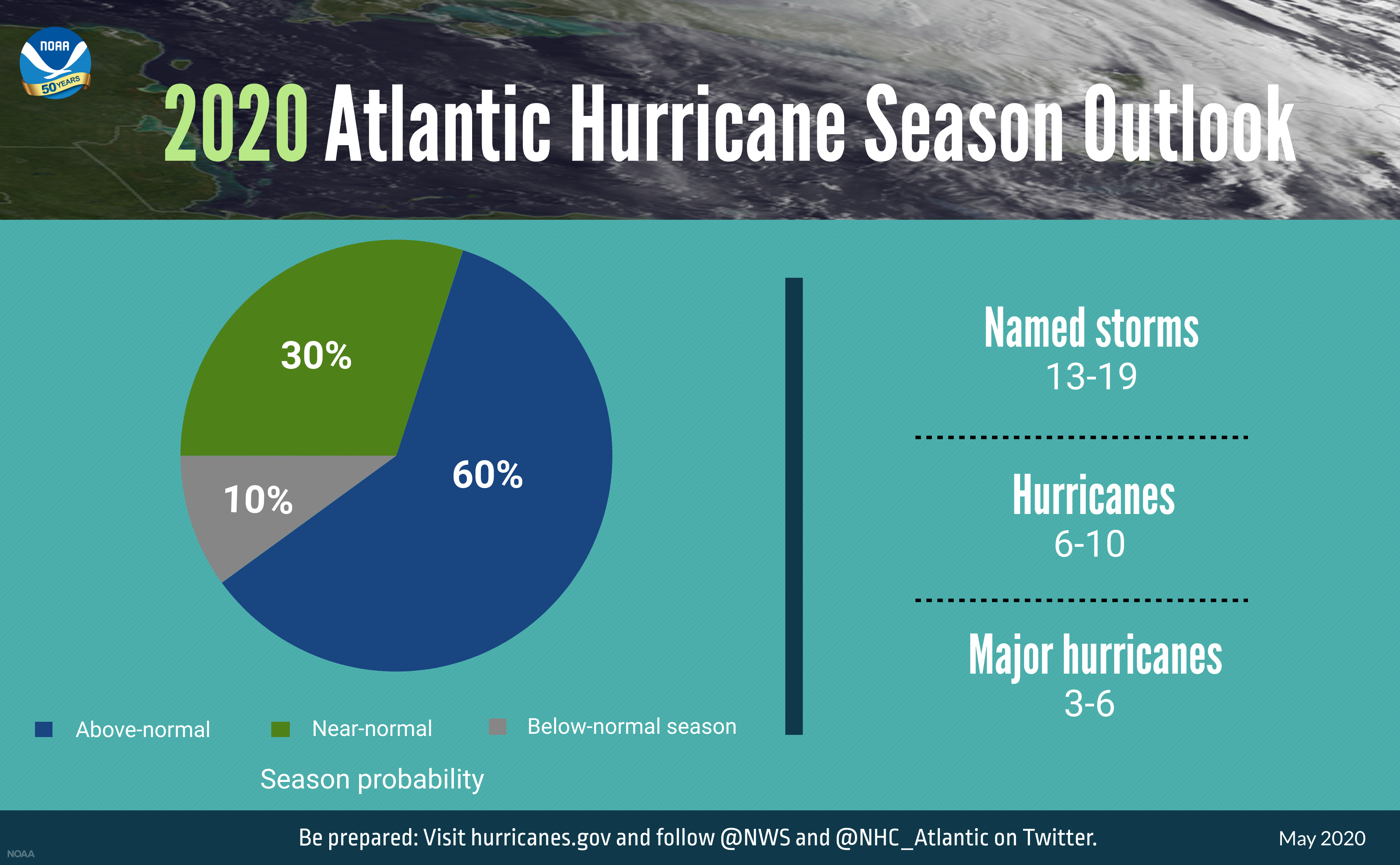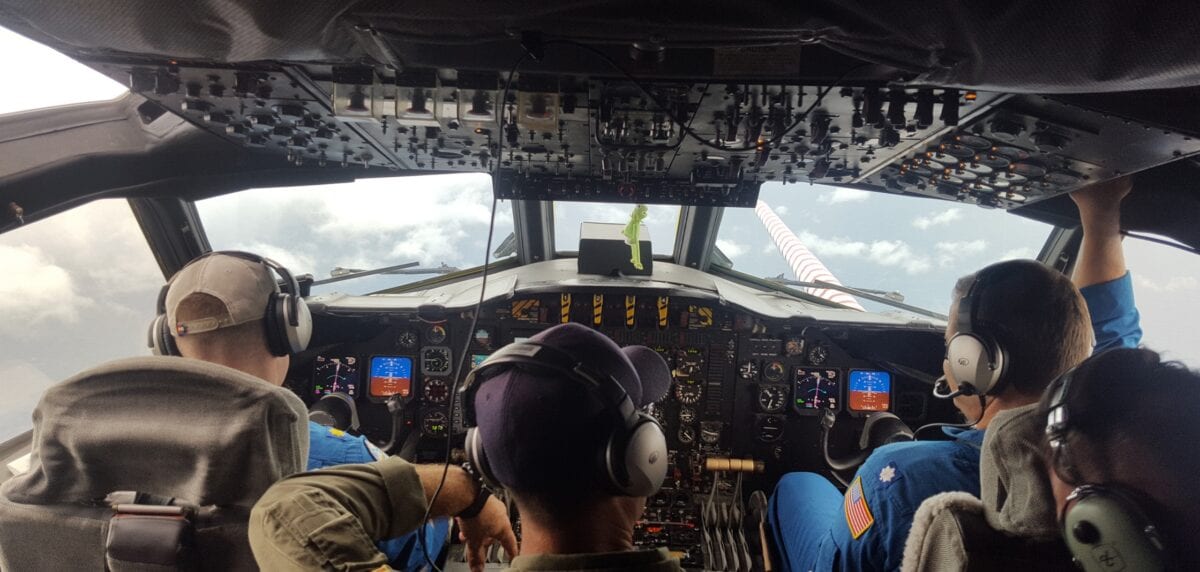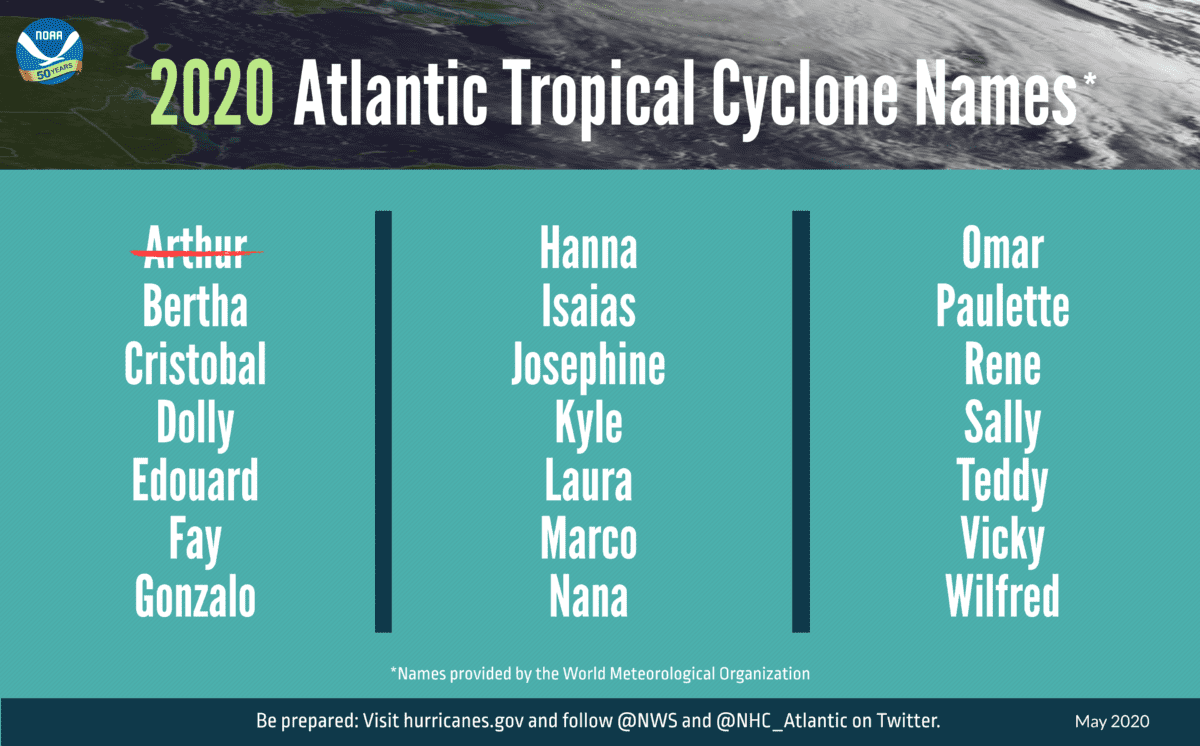But is data missing from computer models on ocean temperatures due to the coronavirus? –

A summary infographic showing hurricane season probability and numbers of named storms predicted from NOAA’s 2020 Atlantic Hurricane Season Outlook: NOAA
By Glynn Wilson –
As if the world were not under assault from enough disasters, scientists recently released the projections for hurricane season 2020 and the forecast is not reassuring, in spite of global cooling due to reduced carbon emissions from the changes in transportation and energy patterns because of the novel coronavirus and measures to combat the pandemic.
Hurricane season officially begins today, Monday, June 1, and runs through November 30. So if you live and work in or near a coastal area close to the Atlantic ocean or the Gulf of Mexico, you might want to take note and update your evacuation plans, scientists say.
Forecasters are warning of an “above-normal” hurricane season, according to the press release from the National Oceanic and Atmospheric Administration’s Climate Prediction Center, a division of the National Weather Service in the U.S. Department of Commerce.
“NOAA’s analysis of current and seasonal atmospheric conditions reveals a recipe for an active Atlantic hurricane season this year,” said Dr. Neil Jacobs, acting NOAA administrator.

The view from inside a National Weather Service hurricane tracking plane: NOAA
As with every hurricane season, the need to be prepared is critically important this year.
“Social distancing and other CDC guidance to keep you safe from COVID-19 may impact the disaster preparedness plan you had in place, including what is in your go-kit, evacuation routes, shelters and more. With tornado season at its peak, hurricane season around the corner, and flooding, earthquakes and wildfires a risk year-round, it is time to revise and adjust your emergency plan now,” said Carlos Castillo, acting deputy administrator for resilience at FEMA. “Natural disasters won’t wait, so I encourage you to keep COVID-19 in mind when revising or making your plan for you and your loved ones, and don’t forget your pets.”
The outlook warns of a 60 percent chance of an above-normal season, a 30 percent chance of a near-normal season and only a 10 percent chance of a below-normal season, although a number of articles are indicating there is a gap in some of the research on global warming and climate change due to stay at home orders under the pandemic.
The official forecast calls for 13 to 19 named storms, with winds of 39 mph or higher, and six to 10 hurricanes, with winds of 74 mph or higher. Three to six major hurricanes are expected in the category 3, 4 or 5 range, with winds of 111 mph or higher.

A summary graphic showing an alphabetical list of the 2020 Atlantic tropical cyclone names as selected by the World Meteorological Organization. The first named storm of the season, Arthur, occurred in earlier in May before the NOAA’s outlook was announced: NOAA
But the ranges are predicted with only a 70 percent confidence level, based on existing computer models, available data, and previous averages. An average hurricane season produces 12 named storms, with six becoming hurricanes and three major storms.
The combination of several climate factors is driving the strong likelihood for above-normal activity in the Atlantic this year, according to NOAA.
* The El Nino Southern Oscillation conditions are expected to either remain neutral or to trend toward La Nina, meaning there will not be an El Nino present to suppress hurricane activity.
* Also, warmer-than-average sea surface temperatures in the tropical Atlantic Ocean and Caribbean Sea, coupled with reduced vertical wind shear, weaker tropical Atlantic trade winds, and an enhanced west African monsoon all increase the likelihood for an above-normal Atlantic hurricane season. Similar conditions have been producing more active seasons since the current high-activity era began in 1995.
But there are a number of articles out there already documenting reduced carbon emissions due to the drop in travel and industrial activity due to the coronavirus, as well as growing gaps in research as scientists are trapped at home and not in the field (see article links below). Climate change due to global warming from the burning of fossil fuels for energy contributes to more destructive hurricanes, especially warmer ocean temperatures.
We reached out to a number of science sources to talk to us about these issues, and we will update this story as those answers come in. A number of authors point out that as the economy picks up steam when states and countries reopen their economies, carbon emissions will come roaring back.
But according to an article in the journal Nature published May 19, daily carbon dioxide emissions around the world have decreased by about 18.7 million tons compared to the average daily emissions of the same time last year. The daily carbon levels being measured now haven’t been seen since 2006, and the stay home measures, travel restrictions, reduced personal and commercial transportation and commercial activity around the world have contributed to an estimated 17 percent decline in carbon emissions. In some countries, the drop was as much as 26 percent.
According to Derek “Deke” Arndt, chief of the Climate Monitoring Section
of the Center for Weather and Climate at the NOAA National Centers for Environmental Information, data on ocean temperatures come from a handful of major source: buoys, both floating and moored-in-place, diving profiler floats or “drones” that bob up and down as they float around the world, as well as ships at sea and satellite information.
“I wasn’t directly involved with the hurricane forecast, so this isn’t exactly from the horse’s mouth. However, I deal with some of the same data sets,” he said in an email interview. “I don’t think there were significant gaps in the data that resolve the large SST (Sea Surface Temperatures) and atmospheric patterns they incorporate into their outlooks.”
I asked if there was any evidence yet pointing to a global cooling trend due to reduced transportation and industrial activity from the pandemic, or is it just too early to say?
“The short answer is yes,” he said. “It’s too early to say.”
The ships that take the observations are not research vessels, he indicated, but mainly merchant vessels and operational government ships. The research data is important to research and future studies, but the operational data drive the operational assessments like the hurricane forecast.
He doesn’t believe there will be any measurable cooling associated with the coronavirus, he said.
“There may be an eventually noticeable slowdown in warming, but it won’t be apparent this year,” he said. “Any reduction in greenhouse gas emissions related to the virus will almost certainly leave us above equilibrium. In other words, we are still adding to the overall greenhouse gas concentrations, but not at the rate perhaps of 2019. Adding to the concentrations means an upward push to temperatures, and we still haven’t caught up to the equilibrium point from the previous decades of emissions.”
Related Coverage
On Earth Day 2020, Future Human Prognosis Looks Cloudy
Further Reading
How Is the Coronavirus Pandemic Affecting Climate Change?
Climate Research in the Coronavirus Age
COVID-19 Could Help Solve Climate Riddles
Why the coronavirus outbreak is terrible news for climate change













